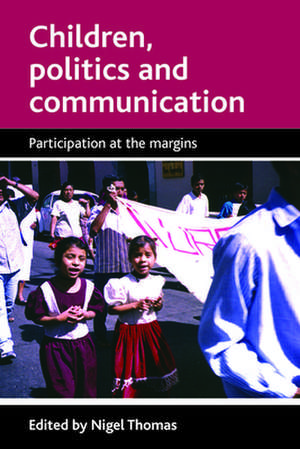Children, politics and communication – Participati on at the margins
Autor Nigel Thomasen Limba Engleză Paperback – 5 mai 2009
Even after 20 years of children's rights and new thinking about childhood, children are still frequently seen as apolitical. All over the world there has been a growing emphasis on 'participation', but much of this is adult-led, and spaces for children's individual and collective autonomy are limited. "Children, politics and communication" questions many of the conventional ways in which children are perceived. It focuses on the politics of children's communication, in two senses: children as political actors, and the micropolitics of children's interaction with each other and with adults. It looks at how children and young people communicate and engage, how they organise themselves and their lives, and how they deal with conflict in their relationships and the world around them. These are children at the margins, in various ways, but they are not victims; they are finding ways to take charge of their own lives.The book is also about adults and how they can interact with children and young people in ways that are sensitive to children's feelings, empowering and supportive of their attempts to be autonomous. With international contributions from a range of disciplines, "Children, politics and communication" is timely and relevant for policy makers, practitioners and researchers engaging with children and young people.
| Toate formatele și edițiile | Preț | Express |
|---|---|---|
| Paperback (1) | 322.50 lei 3-5 săpt. | |
| Bristol University Press – 5 mai 2009 | 322.50 lei 3-5 săpt. | |
| Hardback (1) | 774.98 lei 6-8 săpt. | |
| Bristol University Press – 5 mai 2009 | 774.98 lei 6-8 săpt. |
Preț: 322.50 lei
Nou
Puncte Express: 484
Preț estimativ în valută:
61.71€ • 63.76$ • 51.34£
61.71€ • 63.76$ • 51.34£
Carte disponibilă
Livrare economică 27 februarie-13 martie
Preluare comenzi: 021 569.72.76
Specificații
ISBN-13: 9781847421838
ISBN-10: 1847421830
Pagini: 216
Dimensiuni: 156 x 234 x 14 mm
Greutate: 0.34 kg
Editura: Bristol University Press
Locul publicării:United Kingdom
ISBN-10: 1847421830
Pagini: 216
Dimensiuni: 156 x 234 x 14 mm
Greutate: 0.34 kg
Editura: Bristol University Press
Locul publicării:United Kingdom
Recenzii
Children, Politics and Communication makes a powerful case for better understanding how children communicate and how adults can listen to them with greater sensitivity. It focuses on marginalised children, but in doing so illuminates issues of general importance for child-adult and child-child relationships. Professor Alan Prout, University of Warwick
Focusing on children who live at the margins of society, this book presents strong arguments for taking their knowledge, experience and wishes seriously as contributions to social and political decision making, and for creating spaces for children's autonomy. Professor Berry Mayall, Institute of Education, University of London
Notă biografică
Nigel Thomas, Department of Social Work, University of Central Lancashire
Cuprins
Introduction: Children, politics and communication ~ Nigel Thomas
Charting change in the participatory settings of childhood: a very modest beginning ~ Roger Hart
Children's autonomous organisation: reflections from the ground ~ Vicky Johnson
The children of Loxicha: participation beyond the UNCRC rhetoric? ~ Anne-Marie Smith
Displaced children's participation in political violence: towards greater understanding of mobilisation ~ Jason Hart
Between a rock and a hard place: negotiating age and identity in the UK asylum system ~ Heaven Crawley
Understanding silences and secrets when working with unaccompanied asylum-seeking children ~ Ravi Kohli
Doing Britishness: multilingual practices, creativity and criticality of British Chinese children ~ Li Wei with Zhu Hua and Chao-Jung Wu
Closings in young children's disputes: resolution, dissipation and teacher intervention ~ Amelia Church
Keeping connected: textual cohesion and textual selves, how young people stay together online ~ Julia Davies
Conclusion: autonomy, dialogue and recognition ~ Nigel Thomas
Charting change in the participatory settings of childhood: a very modest beginning ~ Roger Hart
Children's autonomous organisation: reflections from the ground ~ Vicky Johnson
The children of Loxicha: participation beyond the UNCRC rhetoric? ~ Anne-Marie Smith
Displaced children's participation in political violence: towards greater understanding of mobilisation ~ Jason Hart
Between a rock and a hard place: negotiating age and identity in the UK asylum system ~ Heaven Crawley
Understanding silences and secrets when working with unaccompanied asylum-seeking children ~ Ravi Kohli
Doing Britishness: multilingual practices, creativity and criticality of British Chinese children ~ Li Wei with Zhu Hua and Chao-Jung Wu
Closings in young children's disputes: resolution, dissipation and teacher intervention ~ Amelia Church
Keeping connected: textual cohesion and textual selves, how young people stay together online ~ Julia Davies
Conclusion: autonomy, dialogue and recognition ~ Nigel Thomas














